

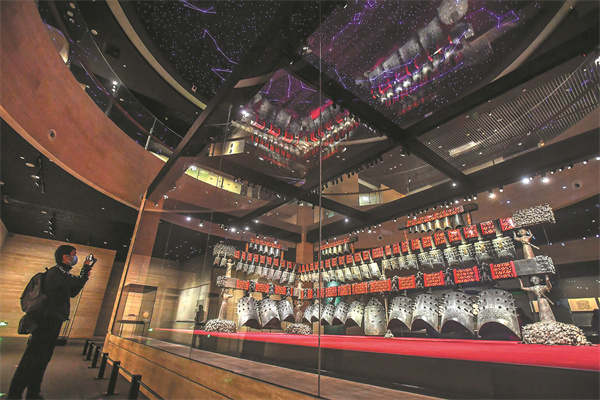
A visitor attends a series of archaeological shows held in December by Hubei Provincial Museum in Wuhan at its new exhibition building.[Photo provided by Xiao Hao/For China Daily]
A legacy has been presented that shows how to achieve success and nourish the ambition of others, Deng Zhangyu reports.
A Qinqiang Opera actor, Hou Yan felt ashamed to talk about her profession as a performer of the local folk opera that mainly thrived in northwestern China in the 1990s. This was at a time when pop songs and music introduced from the West were in vogue and sweeping the land.
Last month, during an opera festival held in Kunshan, Jiangsu province, the 48-year-old actor staged a piece from the opera genre that requires performers to sing in a high pitch, which won her widespread acclaim. Some even flew in from other cities to see her perform.
"As an opera actor, I'm very confident in our culture. I couldn't imagine it decades ago," says Hou, a delegate to the 20th National Congress of the Communist Party of China.
The delegate, after hearing the report that Xi Jinping delivered at the opening session of the congress on Sunday, deeply agrees with the part of the report that stresses "building cultural confidence and securing new successes in developing socialist culture". She has witnessed a revival of Qinqiang Opera in the past decades, epitomizing the country's cultural development.
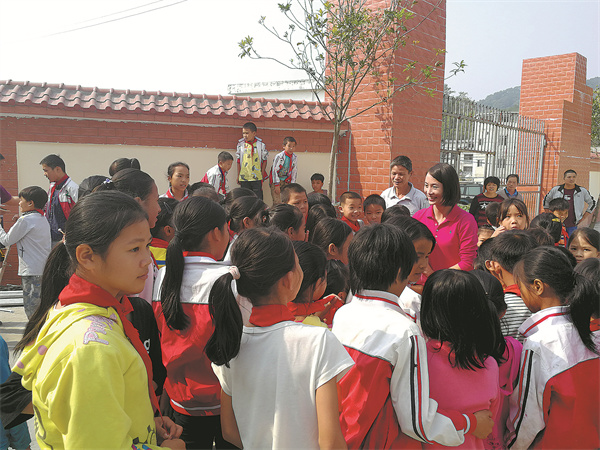
Li Ting shares her medal-winning experience with teenagers at a training base in Wuzhou, Guangxi Zhuang autonomous region, in 2017.[Photo provided to China Daily]
Hou learned Qinqiang Opera from her mother when she was just 4 and became a performer with a troupe in Yinchuan, Ningxia Hui autonomous region, at the age of 16.
In 1993, the troupe was dissolved and Hou left the stage she loved. She then did various jobs, such as working as a vendor, running a clothing shop and acting in small film roles to make ends meet.
In the past decade, the country has made great efforts to develop its culture. Listed as a national-level intangible cultural heritage in 2006, Qinqiang Opera has gradually regained its popularity. Hou returned to the stage in 2000 and devoted herself to the opera form, that dates back to the Qin Dynasty (221-206 BC).
"Ten years ago, our audiences were mostly old people and we were afraid we would lose them one day. Now we have lots of young audience members and our performances are warmly welcomed," says Hou, also deputy director of the Ningxia Performing Arts Group Qinqiang Theater.
Every year, Hou's team presents hundreds of Qinqiang Opera performances in the towns and rural villages of Ningxia.
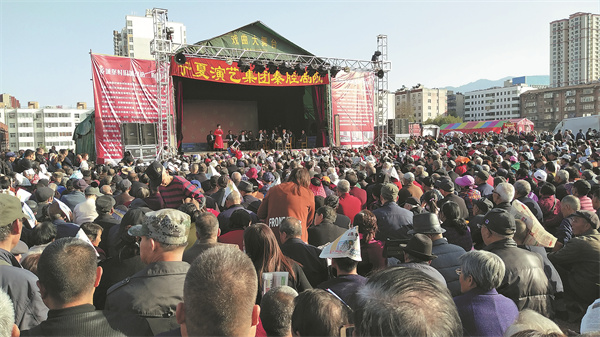
A Qinqiang Opera performance staged by Ningxia Performing Arts Group Qinqiang Theater attracts a packed crowd during a cultural festival held in Baoji, Shaanxi province.[Photo provided to China Daily]
Their performances are often funded by the local government and admission is free.
"Audiences are picky now. They don't just want to watch good operas, but they want to see star performers as well," Hou says, adding that they have to produce better works to meet people's ever-growing cultural needs.
The average age of Hou's opera team is 30. Last year, they staged about 150 school performances. "As we become more confident about our culture, more young people take traditional culture as a fashionable trend and become promoters of their own culture," says Hou.
Fang Qin, director of Hubei Provincial Museum and a delegate from Hubei province to the congress, says that the report delivered on Sunday lifts the importance of culture to a new level.
"Cultural development is an important part of Chinese modernization mentioned many times in the report," says Fang.
As a museum director, Fang witnessed the rising popularity of museums in the past decade.
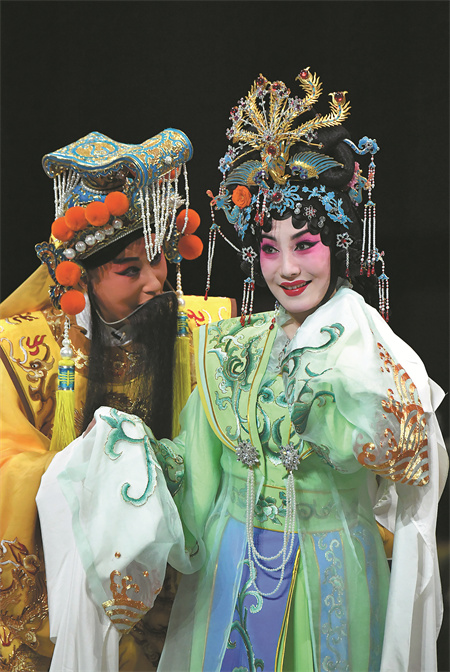
Qinqiang Opera actor Hou Yan (right) performs with a colleague during a Qinqiang art festival in Xi'an, Shaanxi province, in June.[Photo provided by Shao Rui/For China Daily]
The size of Hubei Provincial Museum more than doubled from 50,000 square meters in 2012 to 110,000 sq m in order to accommodate the growing number of visitors.
The museum in Wuhan is known for its collection of bronzeware, and a series of curated archaeology shows in recent years attracted millions of visitors, most of whom were young people.
To attract more people, the museum applies the latest technology, such as virtual and augmented reality, to offer an immersive experience. Fang livestreamed a show online in July about an archaeology site dating back to the prehistoric era. It attracted about 10 million viewers.
Fang says visiting museums has become a routine leisure activity, just like going to cinemas. He would never imagine it being such a popular pastime a decade ago.
The report, regarded as a guide for the culture sector, calls for "a modernization of material and cultural-ethical advancement", which, Fang says, requires museums to provide better services and shows to enrich people's cultural life.
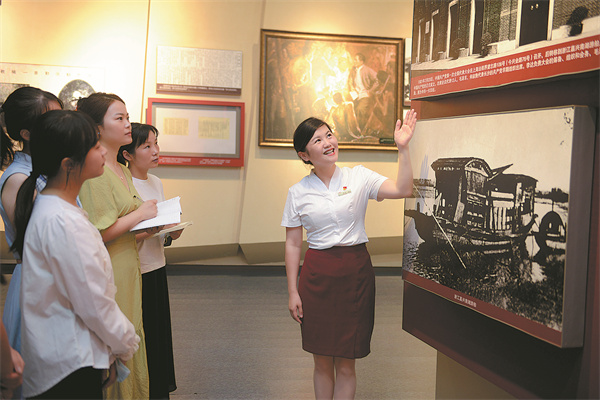
Chen Yan guides young visitors at Hunan CPC History Museum in Changsha, Hunan province, last July.[Photo provided to China Daily]
"It demands that we work harder to meet the public's ever-growing cultural needs," Fang says.
Similar to the popularity of museums, people's passion for the history of the Party and stories of those who contributed to the founding of the People's Republic of China in 1949 has increased sharply in recent years.
Chen Yan, a docent at the Hunan CPC History Museum in Changsha, Hunan province, and her team relay stories based on the history of the Party and have toured across China to present more than 1,000 lectures since 2016. About 6 million people have listened to their lectures.
Chen, a delegate to the congress, says that she is very glad that carrying out public awareness initiatives on the history of the Party is written into the report.
"Revolutionary history is an important part of Chinese culture. Learning the history of the Party enables us to better deal with the future," says Chen.
In September, Chen and her colleagues were invited by middle schools and colleges to lecture on heroic stories of well-known communists to students. A lecture delivered by Chen in mid-September at Hunan Normal University attracted 9,700 young people.
Chen says it is beyond her expectations that so many young people are interested in the Party's history.
According to her experience, the stories of figures who have contributed to people's well-being are popular, such as that of the late agronomist Yuan Longping, the father of hybrid rice.
Many teenagers volunteer to be docents at the Hunan CPC History Museum where Chen works. She is surprised that an 11-year-old boy, a friend of Chen's son, asked to borrow The Communist Manifesto from her, to try and learn more about the Party's mission.
"Learning the Party's history can inspire people. Only when we know where we are from, can we clearly understand where we'll go," says Chen.
Besides spiritual enrichment, sports and physical education are also vital and have developed greatly in the past decade.
Li Ting, a delegate to the congress from the sports sector, says it's rare for the Party to put improving physical education for the young into its report to the National Congress of the CPC.
Li won gold in the women's 10-meter synchronized platform diving at the 2004 Olympic Games in Athens. She is now an official working in the sports department of South China's Guangxi Zhuang autonomous region.
"Young people with strong bodies can build a strong country," Li explains.
She says people in Guangxi actively take part in various sports, noting that there are enough outdoor venues for them to enjoy table tennis, badminton, basketball and skateboarding, among other activities.
Guangxi is hilly, thus rock climbing was introduced into its physical education syllabus. In Mashan county of Nanning city, 23 rock climbing schools have been established since 2017. More than 18,000 students have taken part in rock climbing in the county, according to Li.
The hosting of the 2022 Winter Olympics in Beijing has helped the promotion of winter sports in Guangxi, a region that has a hot summer and a mild winter.
Li often holds activities in schools, inviting medalists to meet with young people in the hope of igniting their passion for sports.
"People's love for outdoor activities has increased in recent years. With the joint efforts of individuals and the government, more people will join in to build a healthy China," says Li.
点击右上角![]() 微信好友
微信好友
 朋友圈
朋友圈

请使用浏览器分享功能进行分享
